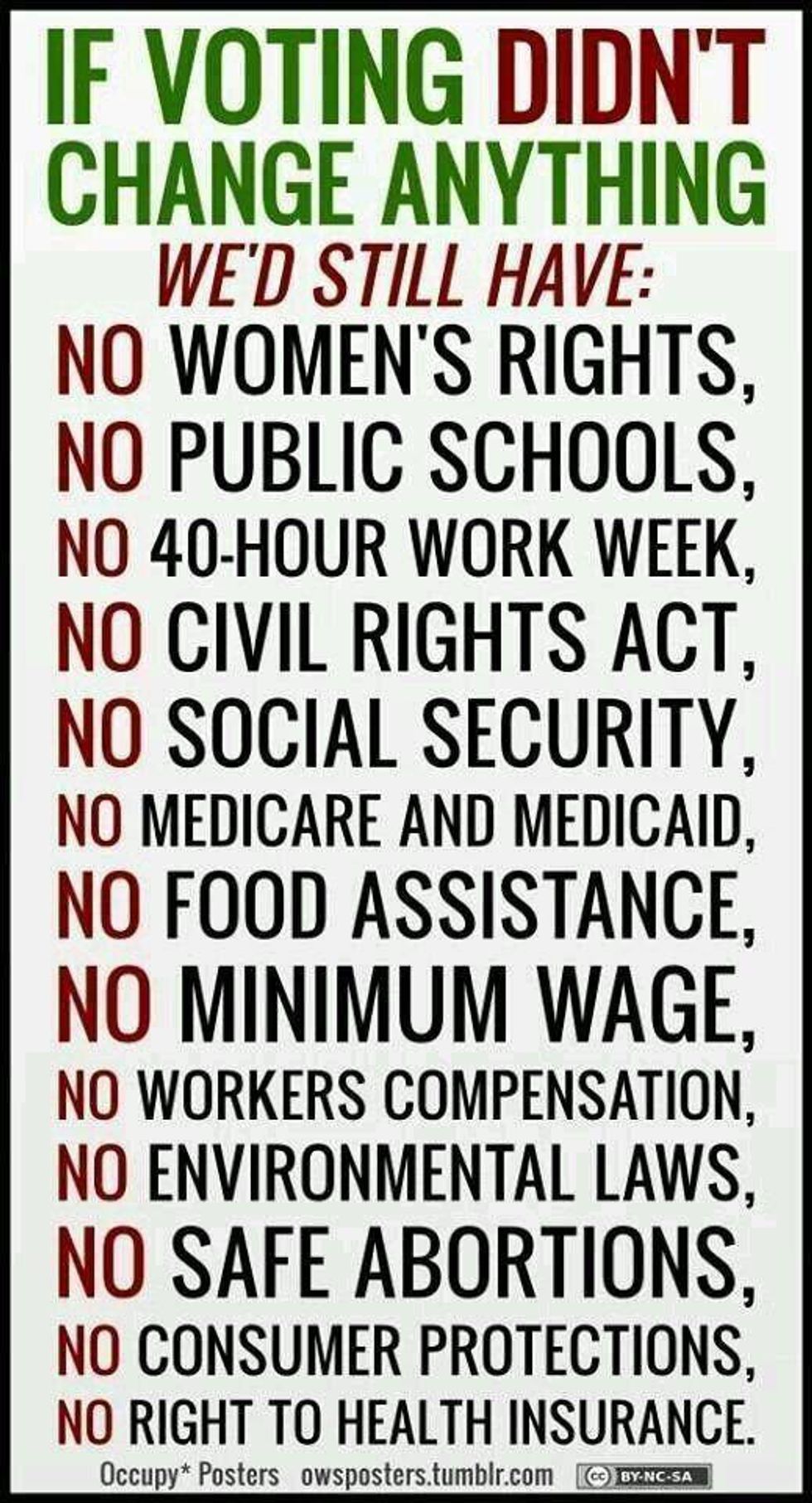Why does the 18-to-29-year-old age group constitute the smallest demographic in terms of voter turnout? As college students and young adults, we certainly have our opinions regarding Presidential candidates, public policies, and politics in general, so why don't we ever act on it? Why do senior citizens aged 60 years and older have the highest rate of voter turnout among all age groups, when presumably it is more difficult for them to go out and vote? Why isn't voting required for all eligible citizens in America, as is the case in several other countries including Australia, Greece, and Singapore? There needs to be real change implemented in the United States, because the influence of the American people is being gradually diminished as party establishments and wealthy donors are increasingly seizing control of the Oval Office.
The struggle for suffrage was a continuous battle fought throughout United States history. The power to vote began with property-holding White men, expanded to all White men, then to all men who passed literacy tests and paid poll taxes, to all men, and eventually to all citizens of either gender and any race or ethnicity. With such a strenuous and perpetual fight for equal voting rights for all, you would assume that more people of all eligible ages would go out and exercise this privilege, but this is not the case at all. For people residing in states with pre-determined political party affiliations, such as New York with Democrats and Texas with Republicans, it is understandable why those aligned with their state's party affiliation may not feel the need to vote, but this is still not excusable. If enough people of the opposite party were to gather and come out in droves to support their party's candidate, and enough people of the state's affiliated party did not feel the need to vote, it is very likely a state could suddenly switch party affiliations, posing disastrous risks.
Besides not exercising this privilege we Americans are fortunate enough to possess, you need to vote in order to make your voice heard. Consider how many changes we would not have had in America if people didn't go out and vote, including no women's rights, no minimum wage, the others listed below, and many more.

To see an example of how the people's choice has weakened over the years, simply look at the Koch brothers. For this 2016 election, the Koch brothers pledged to spend at least one billion dollars in campaign funding for their choice of candidates. Consider all the Wall Street billionaires who are spending exorbitant amounts of money in order to support the candidate(s) they believe will protect as much of their corporate money as possible. Besides campaign financing, think about the political party establishments and so-called "superdelegates" in each party. Superdelegates are comprised of all current governors and members of Congress, as well as former presidents, former vice presidents, and state party chairs. On the Democratic side, these superdelegates comprise about one-sixth of all delegates, and they can vote for any candidate of their choosing. On the Republican side, these superdelegates comprise roughly seven percent of all delegates, but they are only allowed to vote for the candidate that the people of their respective state voted for. The very nature of superdelegates is inherently undemocratic, especially on the Democratic Party side, because these people can overcome the will of the people and vote for the candidate of their choosing. This is why most polls and pundits predict Hillary Clinton will be the Democratic nominee, because she has hundreds more superdelegates than Bernie Sanders does. Even if the popular vote sides with Sanders, these superdelegates could still tip the scale in Clinton's favor. Going out and voting for your candidate will diminish the influence of these superdelegates, especially if voter turnout increases.
Voting indeed makes a difference, no matter which candidate you support. In the upcoming election in November, be sure to go out and vote for a candidate, because it is your future on the line. If a future President passes laws that you completely disagree with, just remember that you had the opportunity to do something about it and you chose not to. If you don't agree with the ideologies of any candidate, remember that you can always fill out a write-in ballot instead, and vote for a person of your choice. Just as long as you exercise this special privilege we as Americans should be grateful to have.





















 sunrise
StableDiffusion
sunrise
StableDiffusion
 bonfire friends
StableDiffusion
bonfire friends
StableDiffusion
 sadness
StableDiffusion
sadness
StableDiffusion

 purple skies
StableDiffusion
purple skies
StableDiffusion

 true love
StableDiffusion
true love
StableDiffusion
 My Cheerleader
StableDiffusion
My Cheerleader
StableDiffusion
 womans transformation to happiness and love
StableDiffusion
womans transformation to happiness and love
StableDiffusion
 future life together of adventures
StableDiffusion
future life together of adventures
StableDiffusion





















